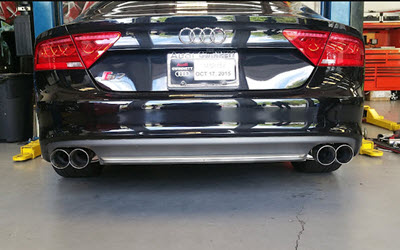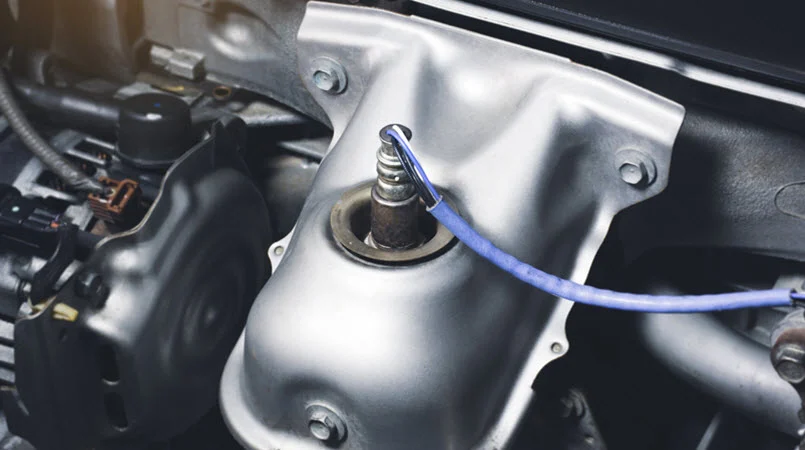Does your Audi experience less smooth operation now than it did before? Has your car’s fuel efficiency decreased or is there a light on the dashboard telling you to check your engine? Your vehicle’s performance issues might be caused by failing oxygen sensors. Though it is common for Audi owners to pay much attention to the changing of the oil and the rotating of the tires, the oxygen sensors serve a very important function of maintaining the efficiency of the engine as well as minimizing emissions. Oxygen sensors, also known as O2 sensors, measure the amount of oxygen in your Audi exhaust system and report what they find to the car ECU so that it can fine-tune the air-fuel mixture for combustion.
Many of today’s Audi cars have two oxygen sensors, the upstream oxygen sensor before the catalytic converter and the second one downstream the catalytic converter. The upstream sensor gauges the concentration of oxygen before the exhaust gases get into the catalytic converter; the downstream sensor checks the efficiency of the converter. An oxygen sensor malfunction will cause problems with engine performance while consuming more fuel and potentially damaging other vehicle components. Let’s see how you can know when the O2 sensors require replacement and why the car repair needs to be done on time.
Symptoms Your Audi May Need New Oxygen Sensors
- Check Engine Light Is On: Your Audi will show a check engine warning light as a main indicator of an oxygen sensor failure. Since the O2 sensor has a direct impact on the air-fuel ratio, your Audi’s ECU will turn on a warning light when it notices unusual readings. If the check engine light illuminates, it is wise to have a mechanic run a scan to determine what code(s) the vehicle is storing.
- Poor Gas Mileage: A faulty oxygen sensor means that your Audi will consume more fuel than it should. When the ECU receives wrong information on the levels of oxygen in the exhaust, it will inject a lot of fuel into the combustion chamber making your engine run rich. Your fuel efficiency declines when your oxygen sensor shows signs of malfunction.
- Rough Idling and Engine Misfires: When your Audi runs correctly, it should have a steady idle, that is; a smooth, constant speed without any fluctuations. However, if the oxygen sensor is faulty it will affect the air fuel ratio and the engine will begin to misfire, hesitate or idle roughly. This may be seen as if your car is stalling or has a hard time running when you stop at a traffic signal.
- Failed Emissions Test: Having a faulty oxygen sensor leads to an emissions test failure in your Audi automobile. The O2 sensor operates as a regulator for emissions so a defective sensor can make your vehicle produce more pollutants during operation. Your car will succeed in emissions testing and maintain its environmental friendliness if you replace the sensor before its next inspection.
- Unusual Exhaust Smell: Malfunctioning oxygen sensors cause excessive fuel to enter the exhaust system. When there is too much fuel in the engine due to a failure of the oxygen sensor you may experience or perceive strong sulfuric odors which smells like rotten eggs. Unusual exhaust odors warrant an inspection of your oxygen sensors.
- Slow Acceleration and Loss of Power: Your Audi’s performance is based on the correct air-fuel mixture. When the oxygen sensors are bad, your engine can lose the ability to produce power and perform at optimum efficiency, which can lead to slow acceleration or inadequate response to a driver’s command — especially when pressing the accelerator pedal. If you experience slow performance of your Audi, then you need to check your O2 sensor.
Why Replacing a Bad Oxygen Sensor Matters
If you wait to replace an oxygen sensor, you might encounter even bigger problems down the road. A bad sensor will cause poor fuel economy, more emissions, and could harm your catalytic converter which is very costly to repair. Maintaining your Audi’s oxygen sensors allows for the vehicle to run correctly and avoids a costly fix in the future.
How Solo Motorsports Can Help
At Solo Motorsports, we have exclusive  expertise in working on Audi and other German brands. If you are experiencing any of the above signs, our highly qualified mechanics can identify the defective oxygen sensors and install new ones with genuine parts and equipment. We have been providing quality service to drivers for more than twenty years and our workshops are now in 9 different cities in Georgia, and they include; Alpharetta, Atlanta, Roswell, Gainesville, Johns Creek, Lawrenceville, and Norcross. Come to one of our nine service centers today for professional service and guaranteed repairs.
expertise in working on Audi and other German brands. If you are experiencing any of the above signs, our highly qualified mechanics can identify the defective oxygen sensors and install new ones with genuine parts and equipment. We have been providing quality service to drivers for more than twenty years and our workshops are now in 9 different cities in Georgia, and they include; Alpharetta, Atlanta, Roswell, Gainesville, Johns Creek, Lawrenceville, and Norcross. Come to one of our nine service centers today for professional service and guaranteed repairs.
